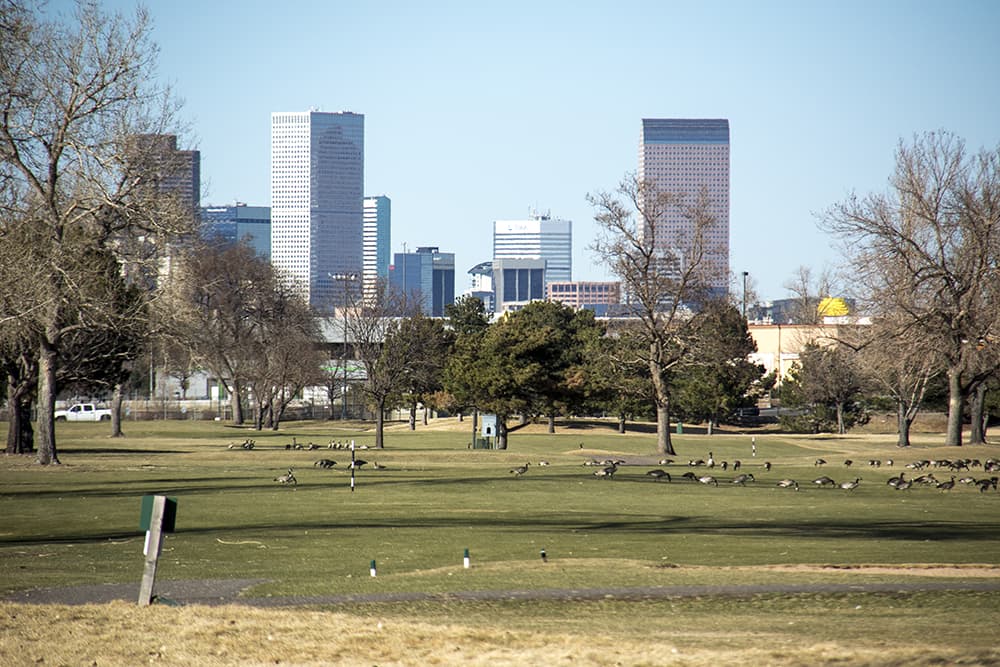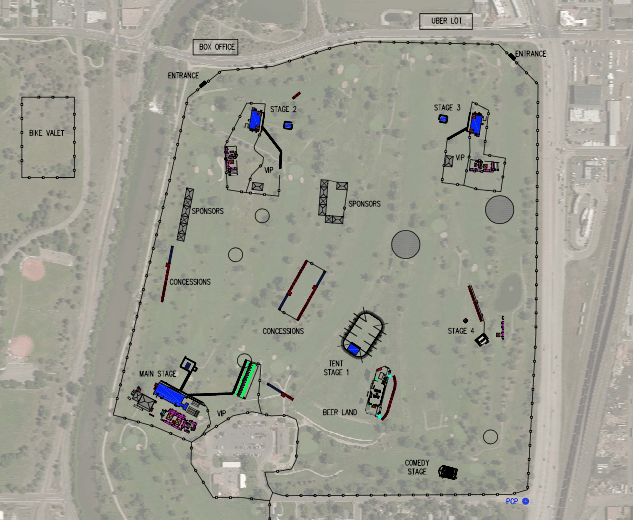
Since the possibility of a music festival at Overland Golf Course was announced back in January, there's been a heated discussion about whether hosting a large music festival is an appropriate use of the land.
The city has pressed forward, though, and after half a year of work with angry residents and festival organizer Superfly, a contract has been drafted.
Tonight, Denver City Council will hold a public hearing about the contract. The meeting starts at 5:30 p.m. and you can sign up to speak half an hour in advance (1437 Bannock St., room 451.)
(Update: Council delayed the vote on July 24. It's scheduled to be discussed again on July 31.)
Here are the basics:
- The festival would be held on the second or third Friday, Saturday and Sunday of September each year, from noon to 10 p.m. each day. This can be changed.
- The maximum attendance would be 80,000 people. (The expectation is more like 30,000 to 60,000 people per day.)
- Overland neighborhood residents will be offered discounted tickets.
- Overland Golf Course would be closed for a total of five weeks each year.
- Load-in would start two weeks prior to the festival.
- Load-out, which includes restoration of the golf course, would take three weeks.
- The contract could keep the festival here for five years, as long as everything goes well.
Here's a preliminary plan for the festival layout:

Andy broke it down back in March:
I count three large outdoor stages, a fourth smaller one, a stage under a tent and facilities for beer and other concessions.
The large gray circles represent shaded and/or “water experience” areas. The only entrances are at the northwest and northeast corners, a move intended to keep people out of residential streets.
Also, you’ll notice a little comedy stage tucked off on a fairway. AEG spokesman David Ehrlich has said the organizers are interesting in showcasing local talent in categories beyond music, potentially including cooking too.
The main stage is relatively close to the residential neighborhood just south of the park, but would be pointed out across the course. A special lot for Uber is set aside to the north, while a bike valet could be convenient for people coming off the riverside bike trails.
There's no lineup right now, but there is a stipulation in the contract that Superfly will work with the city to promote local acts. It also says Superfly will promote local businesses, restaurants and nonprofits.
The money:
Superfly has all kinds of fees to pay.
- $200,000 base rent to the Golf Enterprise Fund
- $5,000 per day for every day over or under five weeks that the golf course is closed
- About $180,000 to $420,000 per year to build golf infrastructure -- $2 per ticket
- About $1 million to $2 million per year into the city’s general fund -- that’s 10 percent of ticket revenues, the standard tax on tickets in Denver
- About $100,000 to $200,000 per year for community improvements -- $1 per ticket
- $25,000 that will fund a discount for golfers who will play a different course while Overland is closed
- $50,000 damage deposit
It will also need to pay for all utilities and for all of the city’s direct labor costs (for rangers and maintenance staff) while it's using the course. There's no public estimate on what those things will cost.
The city will waive up to $200,000 in expected expenses for police, fire department and trash services.
Who's responsible for damages and repairs?
Superfly.
In addition to paying a damage deposit, the company will be required to use "high-quality, specially designed equipment to minimize damage to the grass and turf."
An independent firm will participate in pre- and post-festival walk-throughs, and Superfly must leave the golf course in a condition at least as good as it found it.
What else is Superfly required to provide?
- A shuttle system with a route determined by the city
- Staffed and free bicycle valets
- Clean portable toilets, portable washroom trailers and hand washing units
- Garbage carts and cans and recycling containers, and trash removal
- Security, public safety and crowd control
- Fire protection and emergency medical services
- On-site “command center” to accommodate communication and coordination with city staff, emergency services and any other services
- A 24-hour hotline in order to respond to and resolve guest and resident issues
Superfly is also required to comply with the city's noise ordinance and to work with the city to "identify and fence off areas designated as natural areas, wildlife habitats, golf greens, tee boxes and other areas containing vegetation and trees."
The complaints:
Andy spoke to Helene Orr, a staunch opponent and nearby neighbor to the festival, about her concerns in March.
The impact on the course: Orr, who lives just south of the course, worries that the hordes will have subtler impacts as they stamp down the grass, especially around trees. “When you have compaction of soil, you don’t have plants that can thrive, at best, or at worst can’t survive,” she said.
Traffic: AEG says it hopes to arrange for traffic checkpoints to keep people from driving into nearby neighborhoods. Orr worries that won’t stop pedestrians who are trying to get a free listen. She’s also concerned that noise and traffic will come with the five weeks of set-up and teardown work that the festival could require.
Process: Orr feels the city is improperly using the golf course for an event that will enrich private companies.
Where things stand now:
Councilman Jolon Clark, whose District 7 includes the golf course, said he knows not everyone wants to see this festival happen in this space, but he feels confident that the neighborhood concerns are all addressed or mitigated in the contract.
"I've been working on this for a long time and been at a lot of meetings where people raised their concerns," he said. "There are people who don't like this idea no matter what. You can't change someone's mind with a contract. But to the people who were open to it, the things we were talking about are accounted for in the contract."
The contract requires multiple approvals at the administrative level as Superfly gets closer to actually putting on a festival. There's also built-in protection for the city and the neighborhoods in that the contract incorporates a review that would require Superfly to make changes if problems do occur during the first festival.
Clark said these elements mean the city will continue to have significant leverage over how the event is run.
Clark said the city and the Golf Enterprise Fund will "definitely come out ahead" -- to the tune of roughly $1.5 million.
"The intent is that we'll come out ahead on this, and we'll be able to do deferred maintenance," he said. "This allows them to make more money than they would having it open just for golf for those five weeks.
"There are some people who, even if you eliminate all the parking concerns and even if the golf course is better afterward, there are people who don't believe a golf course should be used for anything but golf. It's like any issue. My goal is to hear what are the concerns that can be mitigated and make sure they're mitigated in the contract."
Council also doesn't get to vote on whether this is an appropriate use for the golf course. That's up to Happy Haynes, the head of Parks and Recreation. City Council just gets an up or down vote on the contract due to the dollar amount involved.
"Parks wouldn't put forward a contract that they didn't think was good for parks," Clark said.
The contract also includes an exclusivity clause, that no other multiday music festival will be held on public land in the city during the five-year duration of the Overland contract.
"A lot of people said, 'Once you open the door, it will be at every golf course; there will be three a year at Overland,'" Clark said. The exclusivity clause ensures that won't happen."
Next steps:
The Denver City Council holds a public hearing Monday on the music festival and associated contract. City Council meets starting at 5:30 p.m. on the fourth floor of the City and County Building, 1437 Bannock St.
You can sign up to speak starting at 5 p.m. or during the council recess.
City Council will vote on the contract the following Monday, July 31. City Council doesn't get to amend or change the contract, so this will be a straightforward up or down vote.
You can read the full contract here and see the presentation on the contract here.












